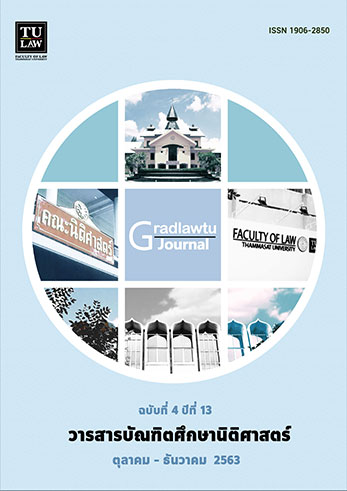THE PROBLEM OF OCCUPATIONAL OR BUSINESS LICENSE RESTRICTION FOR EX-OFFENDERS IN THE THAI LEGAL SYSTEM
Keywords:
Ex-offenders, Freedom of occupation, EqualityAbstract
The problem of occupational or business license restriction for ex-offenders in the Thai legal system related to regulations setting various conditions rohibiting ex-offenders from obtaining occupational or business licenses. Such prohibited provisions impact the Thai legal system and also cause problems for ex-offenders, who suffer from difficulties as they are banned from receiving occupational licenses or entering areas of business.
Results that many problems occur from prohibited provisions. One leading problem related to conceptual inconsistency of punishments is when ex-offenders are released from prison after completing the rehabilitation process, they are denied public employment. Furthermore, these restrictions were inconsistent with the principle of proportionality in freedom of occupation; some limitations on occupation of ex-offenders with criminal records are no longer necessary, and damage their rights rather than acting in the public interest. Given that some prohibited provisions were considered unreasonable, the ex-offenders might be discriminated on the basis of prior conviction. Causing a variety of prohibited provisions reflected in different legal consequences, the restriction was found to be contrary to equality and integrity in the Thai criminal justice system on prohibited provisions for ex-offenders.
The purpose of this research is to indicate occupational or business license restriction problems for ex-offenders in the Thai legal system. In particular, it considers whether regulations are appropriate or consistent with the concept of punishment, including the principle of proportionality to freedom of occupation and the principle of equality, as well as finding solutions to determining balanced and appropriate legal measurement by weighing the economic loss for individuals against the public interest in terms of life and asset safety matters and social regularity in employment or business.
Downloads
Published
Issue
Section
License
บทความหรือข้อความคิดเห็นใด ๆ ที่ปรากฏในวารสารบัณฑิตศึกษานิติศาสตร์เป็นความรับผิดชอบของผู้เขียนบทความโดยเฉพาะ คณะนิติศาสตร์ มหาวิทยาลัยธรรมศาสตร์ และกองบรรณาธิการไม่จำเป็นต้องเห็นด้วย



